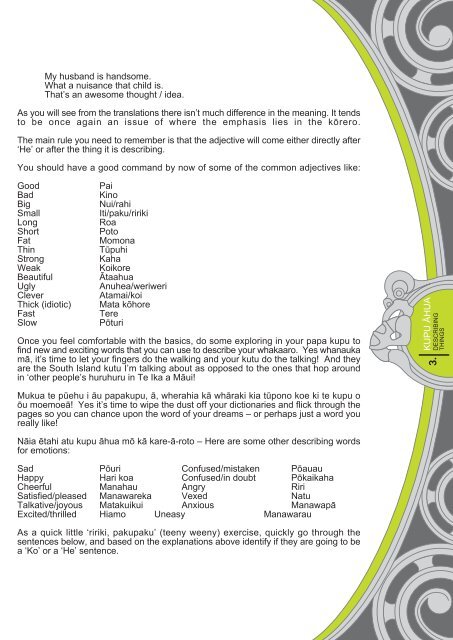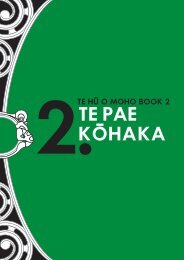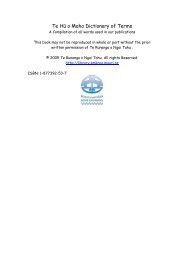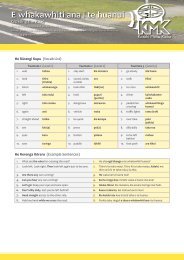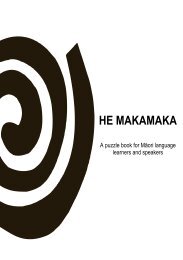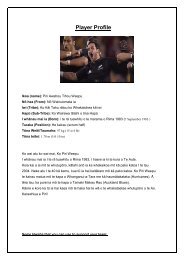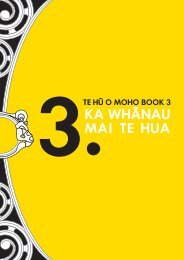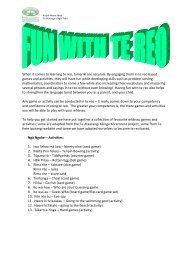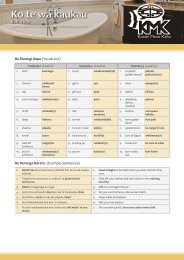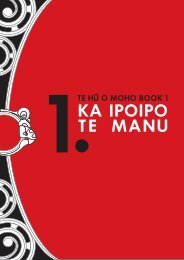Te Hū o Moho Book 4 - Te Pirere - Kotahi Mano Kaika
Te Hū o Moho Book 4 - Te Pirere - Kotahi Mano Kaika
Te Hū o Moho Book 4 - Te Pirere - Kotahi Mano Kaika
Create successful ePaper yourself
Turn your PDF publications into a flip-book with our unique Google optimized e-Paper software.
My husband is handsome.<br />
What a nuisance that child is.<br />
That’s an awesome thought / idea.<br />
As you will see from the translations there isn’t much difference in the meaning. It tends<br />
to be once again an issue of where the emphasis lies in the körero.<br />
The main rule you need to remember is that the adjective will come either directly after<br />
‘He’ or after the thing it is describing.<br />
You should have a good command by now of some of the common adjectives like:<br />
Good<br />
Bad<br />
Big<br />
Small<br />
Long<br />
Short<br />
Fat<br />
Thin<br />
Strong<br />
Weak<br />
Beautiful<br />
Ugly<br />
Clever<br />
Thick (idiotic)<br />
Fast<br />
Slow<br />
Pai<br />
Kino<br />
Nui/rahi<br />
Iti/paku/ririki<br />
Roa<br />
Poto<br />
Momona<br />
Tüpuhi<br />
Kaha<br />
Koikore<br />
Ätaahua<br />
Anuhea/weriweri<br />
Atamai/koi<br />
Mata köhore<br />
<strong>Te</strong>re<br />
Pöturi<br />
Once you feel comfortable with the basics, do some exploring in your papa kupu to<br />
find new and exciting words that you can use to describe your whakaaro. Yes whanauka<br />
mä, it’s time to let your fingers do the walking and your kutu do the talking! And they<br />
are the South Island kutu I’m talking about as opposed to the ones that hop around<br />
in ‘other people’s huruhuru in <strong>Te</strong> Ika a Mäui!<br />
KUPU ÄHUA<br />
DESCRIBING<br />
THINGS<br />
3.<br />
Mukua te püehu i äu papakupu, ä, wherahia kä whäraki kia tüpono koe ki te kupu o<br />
öu moemoeä! Yes it’s time to wipe the dust off your dictionaries and flick through the<br />
pages so you can chance upon the word of your dreams – or perhaps just a word you<br />
really like!<br />
Näia ëtahi atu kupu ähua mö kä kare-ä-roto – Here are some other describing words<br />
for emotions:<br />
Sad Pöuri Confused/mistaken Pöauau<br />
Happy Hari koa Confused/in doubt Pökaikaha<br />
Cheerful Manahau Angry Riri<br />
Satisfied/pleased Manawareka Vexed Natu<br />
Talkative/joyous Matakuikui Anxious Manawapä<br />
Excited/thrilled Hiamo Uneasy Manawarau<br />
As a quick little ‘ririki, pakupaku’ (teeny weeny) exercise, quickly go through the<br />
sentences below, and based on the explanations above identify if they are going to be<br />
a ‘Ko’ or a ‘He’ sentence.


